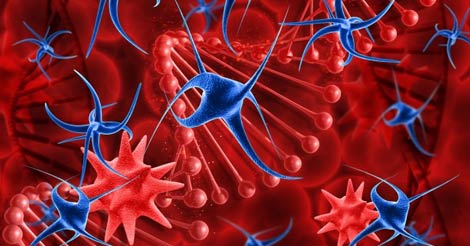Blood cancer, an umbrella term encompassing leukemia, lymphoma, and myeloma, poses a significant health threat in India, affecting individuals across all age groups. Often diagnosed at advanced stages due to subtle initial symptoms and delayed medical attention, blood cancers necessitate urgent action to improve early detection and treatment outcomes. The Indian Council of Medical Research (ICMR) reports highlight the prevalence of late-stage diagnoses, underscoring the critical need for increased public awareness and readily accessible healthcare resources. While the challenges are substantial, advances in treatment methodologies offer renewed hope for patients and their families, signaling a shift towards more effective management and improved survival rates.
Blood cancers disrupt the normal functioning of blood-forming tissues. Leukemia leads to an overproduction of abnormal white blood cells, compromising the immune system’s ability to fight infections. Lymphoma affects the lymphatic system, resulting in swollen lymph nodes and impaired immune function. Myeloma targets plasma cells in the bone marrow, weakening bones and increasing susceptibility to infections. Several factors contribute to the development of blood cancers, including exposure to radiation and chemicals like benzene, a common industrial pollutant in India. Genetic predispositions and lifestyle choices, such as smoking, also elevate the risk. Understanding these risk factors is crucial for individuals to make informed decisions regarding their environment and lifestyle, potentially mitigating their chances of developing these cancers.
The insidious nature of blood cancer lies in its often vague and easily overlooked symptoms. Persistent fatigue, recurrent infections, unexplained bruising or bleeding, and swollen lymph nodes can be mistaken for common ailments, especially in the context of a demanding lifestyle. Other warning signs include night sweats, unexplained fevers, sudden weight loss, bone pain, shortness of breath, and pale skin. These symptoms, often dismissed as seasonal illnesses or dietary deficiencies, especially during the monsoon season in India, necessitate prompt medical attention if they persist for more than two weeks. Delayed diagnosis allows the cancer to progress silently, potentially leading to irreversible damage to the bone marrow and other vital organs.
Early detection is paramount in the fight against blood cancer. Delaying medical consultation can result in the disease advancing to complex stages, requiring more aggressive and potentially less effective treatment. Early diagnosis not only improves treatment outcomes but also significantly enhances the patient’s quality of life. In India, where healthcare access varies considerably between urban and rural areas, strengthening primary healthcare facilities to recognize early signs and facilitate timely referrals to specialized centers is crucial. The emotional, financial, and physical toll on patients and their families underscores the importance of proactive healthcare seeking behavior. Routine blood tests can detect abnormalities before symptoms become severe, offering a critical window for intervention and potentially life-saving treatment.
India’s healthcare system has made notable progress in blood cancer treatment, offering a range of advanced options. Chemotherapy remains a cornerstone of treatment, often combined with radiation therapy for localized disease control. Immunotherapy and monoclonal antibodies, which target specific cancer markers, are increasingly used due to their precision and reduced side effects. A significant breakthrough is the 2024 approval of NexCAR19, India’s first indigenous CAR-T cell therapy. This innovative therapy reprograms the patient’s immune cells to target and destroy cancer cells, particularly beneficial in relapsed cases of acute lymphoblastic leukemia. Stem cell transplants, offered at leading medical centers, provide a potential cure for eligible patients. Supportive care, including blood transfusions and pain management, ensures a holistic approach to patient recovery. These advancements reflect India’s growing expertise in oncology, making advanced treatments more accessible to patients within the country.
The fight against blood cancer requires a multi-pronged approach, encompassing awareness, early detection, and timely intervention. Ignoring potential symptoms can have devastating consequences, as delayed diagnosis often leads to poorer outcomes. However, scientific advancements have significantly improved treatment options, offering not just extended survival but real hope for a cure. Individuals, especially those over 40 or with a family history of cancer, should prioritize annual health screenings, including routine blood tests. Vaccinations against infections like hepatitis, which can indirectly increase cancer risk, provide additional protection. The ICMR actively promotes preventive health measures through initiatives like Ayushman Bharat. The future of blood cancer care in India is evolving rapidly, marked by increasing access to cutting-edge treatments and a growing emphasis on early detection. The message is clear: vigilance, prompt medical attention, and embracing modern treatment modalities are crucial for improving outcomes and transforming the narrative of blood cancer in India from one of despair to one of hope and potential cure.














